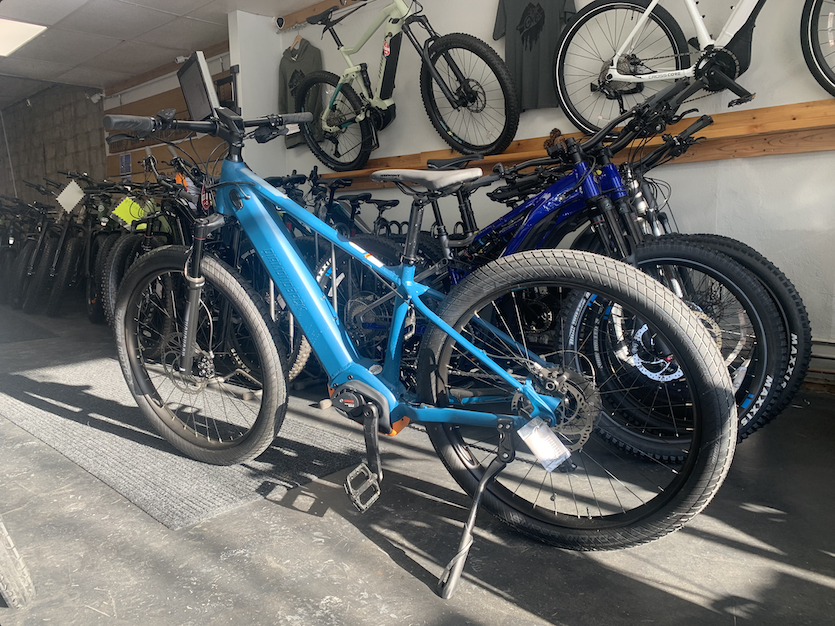
Gov. Mike Dunleavy on Friday vetoed just the fourth bill of his five-year tenure, canceling legislation intended to deregulate electric bike use in Alaska.
The governor has frequently used line-item veto powers to shrink the state budget but has rarely vetoed policy bills.
Thirty-nine other states have passed laws similar to the bill the governor vetoed, and the Alaska Legislature approved House Bill 8 by a bipartisan vote of 57-2, but in his veto message and a statement provided by a spokesperson, the governor said it “creates unnecessary bureaucracy by regulating a recreational activity.”
An official in the governor’s office offered an example: Because the bill defines unregulated e-bikes as having no more than 750 watts of electric power, existing bicycles with more than that might now be considered motorcycles or mopeds.
“If people want these types of activities regulated, the governor believes the decision should take place at the local level, where communities can decide for themselves what they permit and prohibit,” said Shannon Mason, a spokesperson for the governor.
Bicycles with auxiliary electric motors, commonly called e-bikes, are not currently regulated by the state of Alaska and aren’t mentioned in state law. HB 8 would have confirmed that lower-powered versions are not considered motor vehicles and can be used on sidewalks. Some Alaska communities had requested the clarification, as had bicycle proponents.
Rep. Ashley Carrick, D-Fairbanks and the lead sponsor of HB 8, said she was told about the governor’s decision about a week and a half ago and tried calling his personal cellphone to convince him otherwise.
“It’s frustrating. We have a bill that was supported by the vast majority of the Legislature, and here we are,” she said.
Carrick said she will try to convince her colleagues in the House and Senate to override the governor’s decision.
That would require the support of 40 of the Legislature’s 60 members, meeting in a special joint session when the Legislature reconvenes in January.
Sen. Scott Kawasaki, D-Fairbanks, said he also tried to convince the governor to allow the bill to become law.
He said that among lawmakers, there’s a belief that the governor’s decision was driven by more than just the bill itself.
Carrick was among the legislators who criticized the governor’s decision to reduce a temporary funding increase for K-12 schools.
She was among several members of the House’s minority caucus who called for a special session to override the governor’s budget reductions and went so far as to write an opinion column in the Fairbanks Daily News-Miner.
“I can say there’s been chatter about the governor being hard on particular legislators,” Kawasaki said. “I just think the governor’s been a little petty with some of the obvious politics around good bills.”
Carrick declined to say that she believes the veto was retaliatory.
“I would prefer that each issue that we take up … be weighed separately, and I would have liked to see a better dialogue about the contents of House Bill 8 before the veto,” she said when asked.
The governor’s office, when asked whether the veto was retaliatory, flatly denied it.
“No, the veto is not retaliation,” Mason said.
The governor has signed other bills sponsored by critics of his budget vetoes. On Friday, the same day as his veto of the e-bike bill, he signed a bill proclaiming October as Filipino-American History Month. That bill was sponsored by Rep. Genevieve Mina, D-Anchorage, who also signed a letter calling for a veto-override special session.
Dunleavy’s previous policy-bill vetoes were of a 2019 bill that would have restricted the governor’s ability to OK higher pay for some employees; a 2022 bill regulating and taxing electronic cigarettes; and a bill related to legislative pay increases, with the veto ultimately allowing higher pay for legislators, commissioners, the governor and the lieutenant governor.
Kawasaki said that even if the Legislature fails to override the governor’s veto, he has his own version of the e-bikes bill that could be brought up for a vote next year, if lawmakers are willing.
Alaska Beacon is part of States Newsroom, a network of news bureaus supported by grants and a coalition of donors as a 501c(3) public charity. Alaska Beacon maintains editorial independence. Contact Editor Andrew Kitchenman for questions: info@alaskabeacon.com. Follow Alaska Beacon on Facebook and Twitter.




